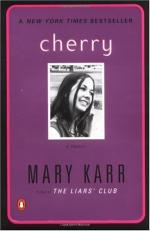|
This section contains 711 words (approx. 3 pages at 300 words per page) |

|
SOURCE: Hubbard, Kate. “Unhappy in Its Own Way.” Spectator 275, no. 8730 (4 November 1995): 49-50.
In the following review, Hubbard compliments the “extraordinary vividness” of Karr's writing in The Liars' Club.
To say that The Liars' Club is a memoir of a dysfunctional Texan family is both true and also reductive. The facts are harrowing—madness, alcoholism, sexual abuse—yet their narration, which crackles with wry humour, affection and defiance, is not. It is fired by a kind of fierce honesty, a determination to shun the comforting lies of memory and the lies which shrouded Mary Karr's childhood. Eschewing self-pity and blame, she tells it straight.
Home was Leechfield, a swampy, evil-smelling Texan oil town. Karr's father was an oil-worker and hunter—‘the proper blend of outlaw and citizen’, free with his punches and his affection, the star-turn of the ‘Liars' Club’, the so-called group of oil-workers who gathered to spin...
|
This section contains 711 words (approx. 3 pages at 300 words per page) |

|


